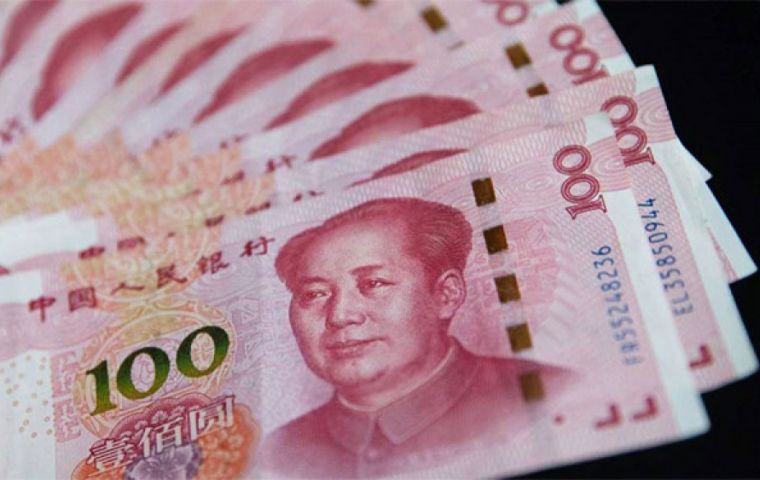MercoPress. South Atlantic News Agency
Chinese currency takes third place in global trade
 The yuan's role as a reserve currency has also grown, with central banks of more than 70 countries having it in their reserve assets
The yuan's role as a reserve currency has also grown, with central banks of more than 70 countries having it in their reserve assets The Chinese yuan has taken third place among internationally-traded currencies in 2020, according to a Renmin University of China report released over the weekend, which also foresees it may continue to expand.
Experts believe there is still great room for the currency's further internationalization, calling for convenient flows of the yuan and expansion of cross border investments.
The yuan internationalization index reached 5.02 at the end of 2020, a sharp increase of 54.2 percent from the previous year, making it No.3 among international currencies.
The rate exceeded the internationalization levels of the Japanese yen and the British pound, according to the 2021 RMB Internationalization Report drafted by the International Monetary Institute (IMI) under Renmin University of China Saturday.
The growth was mainly driven by the steady recovery of the Chinese economy, opening-up of the financial sector, stable monetary policy and stepped-up international currency cooperation, said the report.
Since Chinese authorities allowed yuan access to more foreign financial institutions, overseas investors are seeking potentially higher returns, experts say.
After scrapping quota restrictions on investment via the Qualified Foreign Institutional Investor and the yuan-denominated Renminbi Qualified Foreign Institutional Investor programs, Chinese financial regulators further lowered entry requirements and broadened the investment scope of these programs to facilitate foreign investment.
In 2020, yuan-denominated financial assets held by overseas institutions and individuals surged 40.11 percent year-on-year to reach 8.98 trillion yuan ($1.39 trillion), according to the report.
Meanwhile, the yuan's role as a reserve currency has also strengthened, with central banks of more than 70 countries having it in their reserve assets.
As of the end of 2020, the currency accounted for 2.25 percent of global foreign exchange assets, an increase of 14.8 percent year-on-year, said the report.
Wang Fang, deputy dean of the School of Finance of Renmin University of China and deputy director of the IMI, said the establishment of the 'dual circulation' new development model will provide a historic opportunity for taking the internationalization of the yuan to a new level.
She said the role of the Belt and Road Initiative (BRI) as well as offshore yuan transaction centers should be given full play in reinforcing domestic and international circulation in a bid to promote the global use of the yuan.




Top Comments
Disclaimer & comment rulesCommenting for this story is now closed.
If you have a Facebook account, become a fan and comment on our Facebook Page!